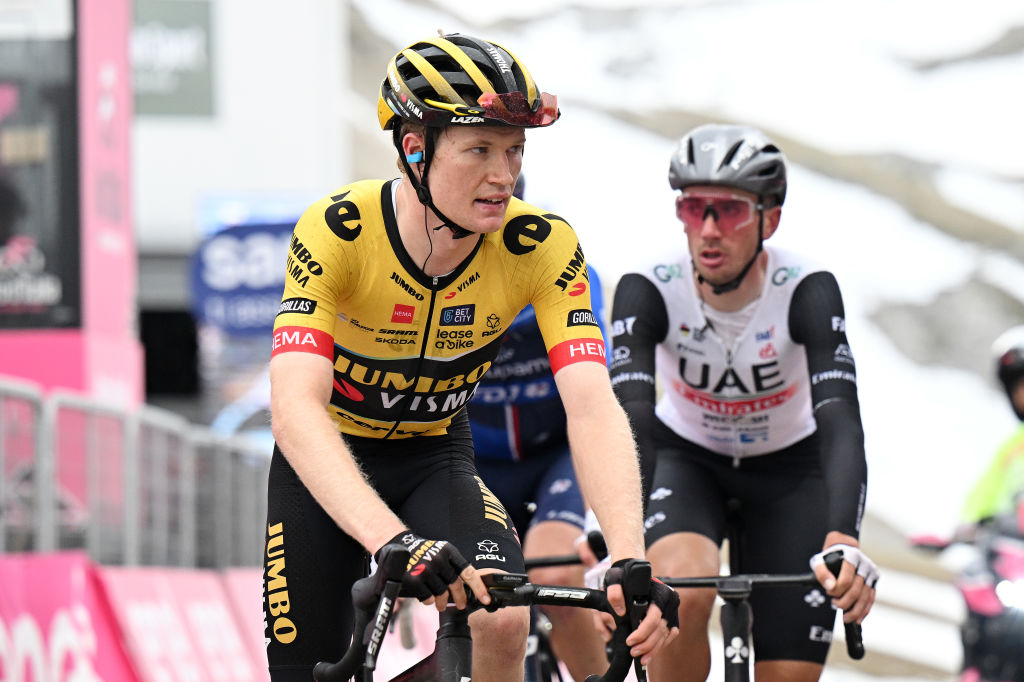Gloag adapting to tough learning curve after last-minute call-up to Giro d'Italia
'Every day I wake up and find out what’s happening' says Jumbo-Visma rider

Thomas Gloag’s initiation into Grand Tour racing at the 2023 Giro d’Italia could hardly have been more unusual after he was a last-minute call-up, but the young Jumbo-Visma racer says that for now at least, he’s ‘getting there’.
Gloag, 21, had less than 24 hours to adapt to the idea he was doing the Giro d’Italia after his teammate Jan Tratnik had a training accident in Italy the Friday before the race.
But as the Briton said on Saturday, despite it being such a tough learning curve, he’s been adapting well to the demands of Grand Tour racing.
He recognised that the biggest challenges of the Giro are yet to come. But the current situation could be summed up as - so far, at least, so good.
“I definitely suffered the first few days when the rain hit, that was pretty tough. But I’ve been feeling better and better in the last few days, so that’s positive,” Gloag said.
Currently in 118th overall on the first rest day, on a personal level, he said his best day was stage 7 to Gran Sasso. "That was nice," he said.
"I was feeling pretty comfortable til the last two kilometres, and we had all the guys there supporting Primož Roglič, so I could take it easy to the line. That was nice because when I can take it easy, it means the boys are doing a really good job.
Get The Leadout Newsletter
The latest race content, interviews, features, reviews and expert buying guides, direct to your inbox!
“So, I’m feeling better every day. I haven’t properly tested myself against the field, but we have plenty of days for that coming up.”
As time goes on and he continues to adapt well to a very different style of racing from what he’s done before, the team’s expectations of how much of a role he can play in their daily strategy are rising. But as he pointed out, that’s only to be expected.
“I think that’s natural, and as the race gets harder, there’s more of a natural selection. It’s almost like you kind of give everything you’ve got. So we’ll see what happens, and hopefully, I can help the team,” he said.
Asked to compare to how he’s performing in other races, he said that he had few points of reference given the way he came into the 2023 Giro was anything but normal.
“It’s so strange because of the way I came into the race. Before, you have expectations of how things are going to go, and normally I’d have really analysed the stage profiles before and worked out how I expect to feel each stage," he said.
“But here, every day, I wake up and find out what’s happening. So it’s a very different race, and I can’t compare the two.”
He’s already noticed, though, just how different the racing is and how much more popular support a national three-week Tour like the Giro gets in comparison to other events.
“I think that two big differences with the Giro and other races are the really long stages, I don’t remember ever racing 200 kilometres back to back to back in the way we’ve raced here,” he said.
“Also, when you go through the towns with the [Giro] balloons and that, that’s a very different experience from other races. I’m sure you get it in other Grand Tours, but seeing the people dressed out in Giro pink and that - it makes it really special.”
Alasdair Fotheringham has been reporting on cycling since 1991. He has covered every Tour de France since 1992 bar one, as well as numerous other bike races of all shapes and sizes, ranging from the Olympic Games in 2008 to the now sadly defunct Subida a Urkiola hill climb in Spain. As well as working for Cyclingnews, he has also written for The Independent, The Guardian, ProCycling, The Express and Reuters.
